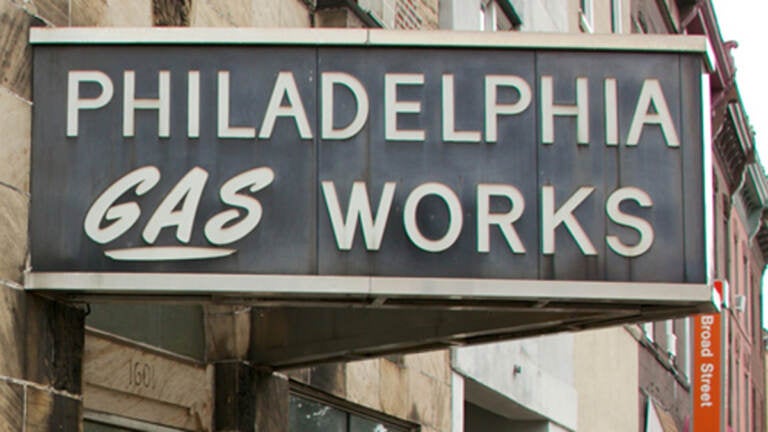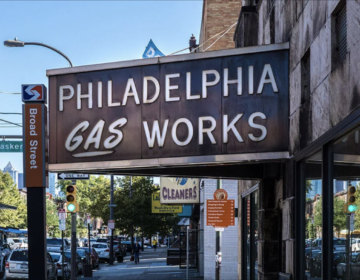Philadelphia Gas Commission approves $19 million in new fossil fuel infrastructure
Climate activists say PGW’s plan for the infrastructure conflicts with the city's climate goals.
Listen 1:15
PGW is under pressure to decarbonize. (Nathaniel Hamilton/Newsworks.org)
This story is part of the WHYY News Climate Desk, bringing you news and solutions for our changing region.
From the Poconos to the Jersey Shore to the mouth of the Delaware Bay, what do you want to know about climate change? What would you like us to cover? Get in touch.
The Philadelphia Gas Commission approved $19.3 million for new natural gas hookups and related infrastructure this week as part of Philadelphia Gas Works’ $194.3 million capital budget for the upcoming 2025 fiscal year. The move raised the ire of climate activists who say it’s in conflict with the city achieving its climate goals, which includes net zero carbon emissions by 2050.
“March was the hottest March on record and the last 10 months were all the hottest 10 months on record,” said Mitch Chanin, a member of the climate justice group POWER Interfaith and a PGW customer. “So we’re in the middle of a climate emergency. The city of Philadelphia now has a commitment to being carbon neutral, meaning no use of fossil fuels by 2050.”
Chanin spoke during a meeting Tuesday after the Gas Commission voted unanimously to approve the funds to build new gas distribution lines to serve new customers.
PGW is the largest municipally owned gas utility in the country. Both its operating and capital budgets are approved by the Philadelphia Gas Commission, whose members are appointed by the mayor and City Council. A fifth member is the current city controller. Philadelphia Facilities Management Corp. is a nonprofit contracted by the city to oversee the day-to-day management of PGW. PFMC’s members are appointed by the mayor.
The mayor’s office did not respond to a request for comment regarding how the city could reach its climate goals while also expanding natural gas infrastructure.
POWER Interfaith has been working to push PGW to change its business model away from fossil fuels.
In what is typically a budgetary process that gains little public attention, the group tried to challenge PGW’s priorities this year through legal means. By intervening in the budget review process, POWER argued that PGW is required by city law to do a cost-benefit analysis of infrastructure expansion to insure a positive return on investment. POWER said the law requires this be done before the Gas Commission’s budgetary review and approval process, which should be transparent and open to public review.
“This is critical because PGW’s capital spending has significant impacts on affordability and climate change,” said Devin McDougall, an attorney with the environmental law firm Earthjustice, who represents the climate justice group POWER Interfaith.
McDougall made the group’s case ahead of the vote to approve the capital budget. He argued that expanding the city’s natural gas infrastructure would increase rates among a population that already has some of the highest “energy burden” in the country, meaning a population of ratepayers who pay a large part of their income to heat their homes.
“Additionally, the more PGW expands its distribution infrastructure, the more expensive it will become for the city to achieve its commitment to decarbonization by 2050, and the harder it will become for the city to protect its most vulnerable residents from climate impacts that will grow in severity as greenhouse gas emissions increase,” McDougall said.
POWER has said in the past that PGW needs to shift to a new business model that could include renewables or render itself obsolete.
“Fossil fuels are already bringing us heat waves, drought, crop failures, rising food prices… and lawsuits against the fossil fuel industry have begun,” said Nadine Young, a member of POWER and retired finance attorney who also spoke at the meeting. “Companies will suffer crippling liability for all of this harm. Meanwhile, costs of [renewables are] dropping and former ratepayers are telling their neighbors about their new heat pumps and induction stoves. And yet PGW plans to expand its infrastructure for new gas business.”
A report published in 2021 pointed out several challenges faced by PGW in developing a business that does not rely on fossil fuels. The PGW Business Diversification Study recommended further study into three separate future pathways for PGW: geothermal energy, expanded weatherization and harvesting sewer gas or landfill gas that produces methane.
Philadelphia Gas Commissioner Evan Urbania, who owns a social media marketing firm and was appointed in 2022 by former Mayor Jim Kenney, said Tuesday that POWER’s interpretation of the city’s requirement that PGW do a cost-benefit analysis of any infrastructure expansion prior to budgetary approval, technically referred to as “load additions,” is “inaccurately narrow.”
“It is clear that [POWER’s] intent is to block new load additions,” Urbania said.
Urbania also said that doing a cost-benefit analysis before granting PGW approval to spend the $19 million in funds “would have the effect of defunding load growth.”
In an email, Philadelphia Gas Commission executive director Gemela McClendon said PGW does a cost-benefit analysis of every expansion project before spending the dollars, but having PGW do a cost-benefit analysis ahead of any capital budget approval process would force the utility to violate state law.
“The Pennsylvania Public Utility Law requires PGW to provide reasonable gas service to any person or entity that seeks it,” wrote McClendon. “The Gas Commission has no authority to override Pennsylvania law by using the Capital Budget to block PGW from adding new customers who voluntarily seek service from PGW.”
McClendon also said POWER’s recommendations would “delay PGW’s ability to provide service.”
But it’s not clear how a city law that requires doing a cost-benefit analysis, in order to show a positive return on investment prior to budgetary approval conflicts with the state law that requires utilities to provide service to any new customer who requests it.
McClendon said PGW complies with state Public Utility Commission rules by conducting cost-benefit analyses of new projects before any individual contracts are signed and the work begins.
New customers also contribute to the infrastructure costs, said McClendon. But it’s unclear how that contribution is calculated.
PGW did not respond to emailed questions.
PGW’s capital budget must now be approved by City Council.
WHYY is your source for fact-based, in-depth journalism and information. As a nonprofit organization, we rely on financial support from readers like you. Please give today.






